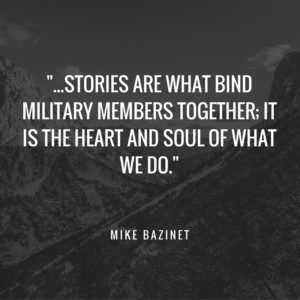Over the next couple of months, Member Mike Bazinet, Associate Director of Plasma Recruitment at Grifols Inc. will be a guest blogger for DirectEmployers Association, authoring a series of posts on how employers can be more effective with their veteran recruitment, outreach and retention efforts. “Stories – The Common Bond Between All Veterans” is the first in this series.
What does a story have to do with a veteran? Many of you may be asking that question, but if you are a veteran, think back to your time in the service. It more than likely will bring a smile to your face, maybe some outright laughter, fond memories and quite possibly some tears. Stories are what bind veterans together; it is how we speak with each of our brothers and sisters in arms. Stories are the gateway to understanding the military veteran who is sitting in front of you during the interview.
Recently, I was driving home from work and stopped by a local VFW for a beer. It had been a rough day and I needed to unwind for a bit before I got home to my family. As I walked into the VFW, I noticed men and women of all ages sitting, standing and conversing with one another. I instantly felt a kinship with everyone in the building; I knew that no matter where I sat I would be in a conversation within a few minutes. I walked to the bar and sat down near an older man who extended his hand to me before I could even order a drink. As I shook his hand, I noticed his baseball cap said WWII and had a bunch of small hatpins all around it. I was sitting next to a man who fought in WWII, one of the few left of that generation that gave their life for our nation. We started conversing and soon he was reminiscing about his time in the war. The level of detail he used was amazing, from the type of cigarettes, he smoked, to signage on buildings that were destroyed, and even the smells and horrors that still live with him. I just sat there listening intently as I formed a mental picture of his time in WWII. We smiled, laughed and even shed a few tears as he told me of friends he had lost. He went on to tell me about his time after the service: where he moved to, his beautiful wife (he carried a picture of her taken in 1941), his children and even a little bit about his great-grandchildren. It was by far one the best times I had in a long time; his stories made me realize my day was not that bad after all.
 Sadly, he passed away a few months ago but his stories will continue to live on inside of me. I got to see the inner being of this man. I could feel his love of country, how he cared and loved his family and how he revered the men and women around him throughout his life. He was a hard worker who came back home after the war and started a successful business that he left to his sons. He would be the first to tell you that his time in the military helped him be successful after the war. He loved the military, but more importantly, he valued the lessons learned.
Sadly, he passed away a few months ago but his stories will continue to live on inside of me. I got to see the inner being of this man. I could feel his love of country, how he cared and loved his family and how he revered the men and women around him throughout his life. He was a hard worker who came back home after the war and started a successful business that he left to his sons. He would be the first to tell you that his time in the military helped him be successful after the war. He loved the military, but more importantly, he valued the lessons learned.
I tell you this story because stories are what bind military members together; it is the heart and soul of what we do. As you read that story, you more than likely were building a mental picture of what my time with this man was like. Maybe you had a similar situation that happened to you that you remembered as you were reading this blog. I am sure if you and I met in person, and you were previously in the military, it would not take long to recognize we were both in the military. Once we determined that, we would begin talking about where we were stationed, what service we were in, and what we did. Shortly, we would find something in common and start telling our stories.
Last month I was in Milwaukee with a coworker. We went out to dinner and then got into an Uber to go back to the hotel. The driver told me he was from North Carolina. I told him I was from North Carolina and that I lived outside of Fort Bragg. He looked at me and said he was a retired veteran who spent most of his time in Fayetteville, NC. Instantly we started talking about our time in the service, and the bond was solidified. I had no idea who this man was before I got into his car but it took only five minutes to realize we were connected through our military stories and the bond of the military veteran. My coworker and I got to the hotel and all she said to me was, “Wow that was amazing.” She was taken aback by how fast I bonded with another veteran. She learned more about me on that drive home than she had learned in 7 years of working with me. I opened up to this total stranger about my time in the service. That night my coworker learned that stories are what bring veterans together and tighten the military bond.
Interviewing veterans is difficult for all parties involved, both the hiring manager and the veteran may have limited knowledge of each others’ worlds, they may be apprehensive and not know how to ask or answer questions. These dynamics need to break down. So how do we do it? How do we get to understand the veteran candidate? We do it be getting to the veterans stories, we do it by getting the veteran to let their defenses down, we do it by inviting them to tell stories rather than always answering pointed questions. Yes, questions are important and we must ask them but think about rephrasing them allowing the veteran to answer with a story.
I have traveled extensively within my company and have sat on many veteran interviews. I have witnessed how my own recruiters used to conduct interviews, and I have been on the other side of the desk interviewing for positions as a veteran. It did not take me long to realize I needed to adjust how my recruiters approached and conducted their interviews. The first thing I did, is what most people would do, I jumped right in and told them about the rank structure, the different jobs, the lifestyle and everything I knew about the US Air Force. They did learn about the military but it did not do anything to change their interview process, they still asked the same question, the veterans still answered in ways that my recruiters did not understand. Usually, ending in a failed interview for all parties. After months of training we still were falling short, frustration was starting to creep in, comments such as “veterans just are not what we need” and “they just can’t articulate what they did” started to creep into the conversations among my recruiters. I needed to think of another way to get them to conduct their veteran interviews.
I went home that day and talked to my wife, the woman that saved me from the depths of unemployment with a simple statement. It was the statement she told me when I was at my lowest point in my life; “Mike, it’s not about what you did, but rather who you are! Go tell them the stories you tell me and the kids every day, let them see the man I know you are.” I remembered, how on my next interview I answered every question with a story of how I did something, said something or made something happen. At that point, it clicked; I needed to get my recruiters to reach the veteran through stories. The following week, I called the recruiters together for a training session on military hiring. They immediately thought they would hear the same stuff as they had in the past. Little did they know, a change was about to happen, we were about to hire veterans on a large scale and we were going to do it by getting them to tell us stories.
I trained my recruiters to open all of their military interviews with the following verbiage: “Thank you for visiting with me today. I want to hear your military stories as we progress through our interview. Your stories will help me better understand your job fit during our time together.” If interviewers practice this technique, they will witness the veterans’ defenses come down, and they will notice a more comfortable interviewee. As interviewers, we need to remember these men and women have likely never been in our corporate world. For many veterans, it is the first time they have written a resume and maybe their first interview. As interviewers, we need a way to put the veteran at ease, and get them in a comfortable state where they have a better opportunity to shine. As a veteran myself, I can confidently say that stories bring our defenses down and increase our comfort levels during interviews. The next time you interview a veteran that is separating or retiring from the service, ask them to share their stories and watch them relive their experiences. Are you able to translate their stories into your workplace? If so, make it a great day and HIRE A VETERAN.

Mike Bazinet is the Associate Director of Plasma Recruitment with Grifols Inc., a global healthcare company that creates 53 annual affirmative action plans. During a 20-year career in the United States Air Force, he recruited pilots, navigators, engineers, medical doctors, nurses and pharmacists. As a civilian, he worked for Orion International, a recruitment organization specializing in assisting retiring and separating veterans to gain access to positions within Corporate America. He was also instrumental in creating and launching the Orion International Health Professions division. In 2008, Mike took a recruiting position at Grifols and was quickly promoted to Supervisor of Recruitment in 2009, then Manager of Recruitment in 2011. In 2014, his team achieved a milestone year, hiring over 3,400 new employees. His team surpassed that milestone in 2015 and hired a total of 3700 employees into the Grifols family. In his current role as Associate Director of Staffing, Mike has control of the strategic development and process of the recruitment efforts within Grifols Plasma Organization. Since being at Grifols Mike has been directly involved with the affirmative action program at Grifols and has played an integral part in the training and execution of the overall program at Grifols.


Wow, Mike, that was a GREAT story. Definitely something that everyone can learn from. Your story includes many great take-aways and I can see a lot of recruiters changing their normal interview routine right away.
I love working with you, Mike, and I am so happy you will be sharing more blogs with our Members. Thanks so much for your willingness to share your successes with others!